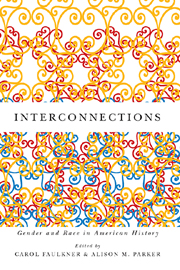Book contents
- Frontmatter
- Contents
- Introduction
- Part 1 Bridging History, Theory, and Practice
- Part 2 Frontiers of Citizenship
- Part 3 Civil Rights and the Law
- 5 Countable Bodies, Uncountable Crimes: Sexual Assault and the Antilynching Movement
- 6 Persecuting Black Men and Gendering Jury Service: The Interplay between Race and Gender in the NAACP Jury Service Cases of the 1930s
- Part 4 Sexuality, Class, and Morality
- Epilogue: Gender and Race as Cultural Barriers to Black Women in Politics
- Selected Bibliography
- List of Contributors
- Index
5 - Countable Bodies, Uncountable Crimes: Sexual Assault and the Antilynching Movement
from Part 3 - Civil Rights and the Law
Published online by Cambridge University Press: 05 December 2015
- Frontmatter
- Contents
- Introduction
- Part 1 Bridging History, Theory, and Practice
- Part 2 Frontiers of Citizenship
- Part 3 Civil Rights and the Law
- 5 Countable Bodies, Uncountable Crimes: Sexual Assault and the Antilynching Movement
- 6 Persecuting Black Men and Gendering Jury Service: The Interplay between Race and Gender in the NAACP Jury Service Cases of the 1930s
- Part 4 Sexuality, Class, and Morality
- Epilogue: Gender and Race as Cultural Barriers to Black Women in Politics
- Selected Bibliography
- List of Contributors
- Index
Summary
In the context of the Negro problem, neither whites nor blacks, for excellent reasons of their own, have the faintest desire to look back; but I think the past is all that makes the present coherent, and further, that the past will remain horrible for exactly as long as we refuse to assess it honestly.
—James Baldwin, Notes of a Native SonThe Cost of Success
On June 13, 2005, the US Senate apologized for filibustering antilynching legislation from the early twentieth century that would have made lynching a federal crime. In essence, the government apologized for failing one of its most basic functions: protecting its citizens from harm. This apology acknowledged that victims of lynch mobs, largely southern African Americans killed by whites, did not receive appropriate protection of law officials to prevent or punish their deaths. This apology was long overdue and reflects a popular consensus, perhaps prompted by scholarship, that lynching is unjust.
Had this apology been issued one hundred years ago, however, it might have been different. It might have included an apology for the government's failure to protect African American women from white sexual assault. Activists in the earliest phase of the antilynching movement, the two decades at the turn of the century, had what we today would call an intersectional understanding. Lynch critics considered the mob killings of black men and the sexual assaults on black women to be complementary problems with similar root causes and faulted the criminal justice system for failing to prevent or punish either crime.
- Type
- Chapter
- Information
- InterconnectionsGender and Race in American History, pp. 133 - 160Publisher: Boydell & BrewerPrint publication year: 2012

